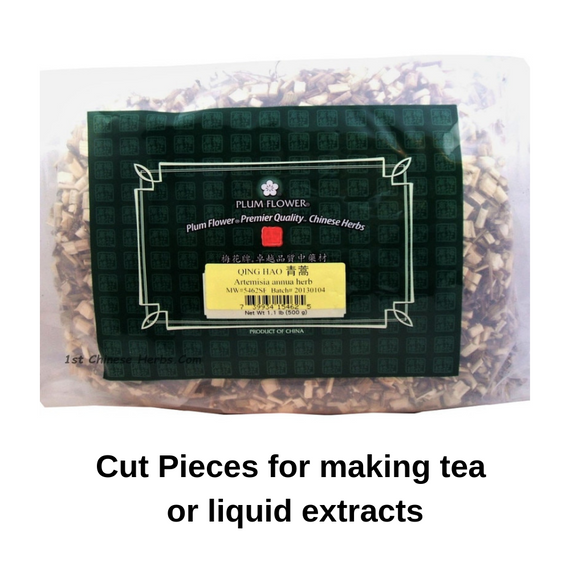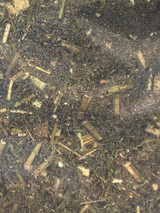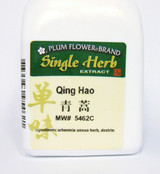Qing Hao (Artemisia Annua): An Exploration of Its Historical, Medicinal, and Modern Significance
Qing Hao, scientifically known as Artemisia annua and commonly referred to as Sweet Wormwood, has been a cornerstone in Traditional Chinese Medicine (TCM) for centuries. Its significance extends beyond traditional applications, impacting global health through its key active compound, artemisinin, which revolutionized the treatment of malaria.
Historical Context and Traditional Uses
Qing Hao in Ancient Medicine
Qing Hao’s medicinal use dates back to the Han Dynasty (206 BCE - 220 CE), as documented in the ancient medical text “The Handbook of Prescriptions for Emergencies” by Ge Hong. This text illustrates Qing Hao's application in treating fevers and malaria-like symptoms. Historically, it was prized for its ability to clear "summer heat" and alleviate intermittent fevers, conditions that align with symptoms of malaria.
Traditional Chinese Medicine Perspective
In TCM, Qing Hao is classified as a cooling herb that enters the Liver, Gallbladder, and Kidney meridians. It is primarily used to clear heat and dampness, addressing conditions such as fever, jaundice, and skin disorders. TCM practitioners use Qing Hao to balance internal body heat, reduce toxins, and promote overall health, leveraging its cooling and detoxifying properties.
Qing Hao (Artemisia Annua) and Its Potential Role in Treating Lyme Disease
Lyme disease, caused by the bacterium Borrelia burgdorferi and transmitted through tick bites, is a complex infectious disease characterized by symptoms such as fever, headache, fatigue, and a characteristic skin rash. If left untreated, it can spread to joints, the heart, and the nervous system. Traditional treatments often include antibiotics; however, some patients seek alternative or complementary therapies to address persistent symptoms. Qing Hao (Artemisia annua) has gained attention as a potential adjunctive treatment for Lyme disease due to its unique properties.
Active Components and Mechanism of Action
Artemisinin and Derivatives
The primary active compound in Qing Hao is artemisinin, which is renowned for its potent anti-malarial properties. Its mechanism involves the generation of reactive oxygen species (ROS) that can damage microbial cells. This oxidative stress mechanism may also be effective against the bacteria responsible for Lyme disease.
Additional Bioactive Compounds
Qing Hao contains other bioactive compounds, such as flavonoids and essential oils, which have demonstrated antibacterial, anti-inflammatory, and immune-modulating effects. These properties are particularly relevant for managing Lyme disease, which often involves persistent bacterial infection and inflammation.
Potential Benefits for Lyme Disease
-
Antimicrobial Activity
- Effect on Borrelia burgdorferi: Research suggests that artemisinin and its derivatives may have bactericidal effects on Borrelia burgdorferi. Laboratory studies have shown that artemisinin can inhibit the growth of Borrelia and disrupt biofilms, which are protective layers that bacteria form to shield themselves from the immune system and antibiotics.
- Broad-Spectrum Action: Qing Hao's antimicrobial properties extend beyond Borrelia, potentially addressing co-infections that are common in Lyme disease, such as Babesia and Ehrlichia species.
-
Anti-Inflammatory Properties
- Reducing Inflammation: Lyme disease is often accompanied by significant inflammation, contributing to joint pain, neurological symptoms, and general malaise. Qing Hao’s anti-inflammatory effects can help mitigate these symptoms. The herb's ability to inhibit pro-inflammatory cytokines and reduce oxidative stress may alleviate inflammation and promote tissue healing.
- Neuroprotective Effects: Inflammation in Lyme disease can affect the nervous system, leading to symptoms such as brain fog and neuropathy. Qing Hao's compounds have been studied for their neuroprotective properties, suggesting they might help in reducing neuroinflammation and improving cognitive function.
-
Immune Modulation
- Enhancing Immune Response: Qing Hao may help modulate the immune response, enhancing the body’s ability to fight off persistent infections. It can stimulate the production of certain immune cells and cytokines that are crucial for combating infections like Lyme disease.
- Balancing Immune Function: For patients with Lyme disease, where immune dysregulation is a concern, Qing Hao's balancing effect on the immune system can be beneficial. This can help reduce overactive immune responses that contribute to chronic symptoms.
-
Support in Detoxification
- Clearing Toxins: Qing Hao has been traditionally used to support liver function and detoxification processes. In the context of Lyme disease, where toxins from bacterial die-off and inflammation can exacerbate symptoms, Qing Hao’s detoxifying properties may assist in clearing these toxins and reducing systemic burden.
- Supporting Digestive Health: Some patients with Lyme disease experience digestive issues. Qing Hao’s properties may help in improving digestive function and supporting gut health, which is crucial for overall immune function.
In Vitro Studies
Studies conducted in vitro have shown that artemisinin and other compounds in Qing Hao can inhibit the growth of Borrelia burgdorferi and disrupt its biofilms. However, these findings are preliminary and require further clinical validation to establish efficacy in human subjects.
Animal Studies
Animal studies have provided some evidence of Qing Hao's effectiveness in reducing bacterial load and improving symptoms related to Lyme disease. These studies indicate a potential for Qing Hao to complement conventional antibiotic treatments.
Human Clinical Trials
Human studies specifically investigating Qing Hao's effects on Lyme disease are limited. Some anecdotal reports and case studies suggest that it may help alleviate symptoms and improve quality of life for Lyme disease patients. More rigorous clinical trials are needed to confirm these benefits and establish appropriate dosing and safety profiles.
Drug Interactions
Qing Hao can interact with other medications, including those commonly used by Lyme disease patients. It is important to consider potential interactions, particularly with medications metabolized by the liver or those that affect the immune system.
Common Name: Artemisia Annua
Botanical Name: Artemisia Annua
Channels: Liver, Kidney, Gallbladder
Other Names: Sweet Wormwood, Sweet Annie
Pin Yin Name: Qing Hao
Other Ingredients: None, nothing has been added to this product. No fillers or excipients
Package Size: 500 Grams (1.1 pounds)
Form: Powder - Fine powder 80 to 100 mesh size (similar to the consistency of baking flour)
Dosage: Follow doctors instructions on how to use this herb.
How to use Qing Hao Herb: Encapsulate, Brew as a tea, Use in a formula
Origin: China
Brand: Plum Flower, species - authenticated herbs
Herb Category: Herbs that Clear Heat and Purge Fire
Cautions: Do not use if pregnant or nursing. Potential side effects include gastrointestinal upset, allergic reactions, and, in rare cases, liver toxicity.Do not use with digestion issues such as food stagnation, or diarrhea. Do not use with calcium channel blockers. Avoid if allergic to Marigold, Daisies or Ragweed
Naturally Occurring Compounds: Qinghaosu, Qinghao acid, Artemisinol, Palmitic acid, Coumarin, Scopoletin, 3,5- Dihydroxy-6,7,3′,4′-teramethoxyflavonol, Pentacosane, Tricosanone, β-Sitosterol, Stigmasterol, Cineole,
Additional Information:
- Powders can be easily made into capsules. One pound makes approximately 700 capsules, depending on the size of the capsules
- Special Note: This is not the same as Artemisia absinthium.
- The translation of Qing Hao is Blue-Green Artemisia.
- Qing Hao is one of the herbs which is mentioned in S. Buhners book titled "Healing Lyme Disease"
- Clears Summer Heat
- Cools the Blood
- Clear Fever from Deficiency
- Product Properties: Bitter, Cold
Herb Combination with Qing Hao
- Chai Hu
- Lotus
- Rehmannia
- Pinellia
- Huang Qin
- Peony

Check out our How to Use Bulk Herbs page to see how to use herbs correctly. Our web page is constantly expanding, as of today we have articles on:
- How to make salves, poultice, tinctures, teas, capsules, gargles, and foot bathes
- How to make a citrus facial splash
- Cayenne pepper: Caterpillar and aphid spray ( Natural insect repellent )
- Citrus potpourri basket
About Plum Flower Quality Herb Powders
Plum Flower is an established worldwide manufacturer of high-quality Chinese herbs, and innovative Chinese medicinal herbs and products. Plum Flower uses sulfur-free herbs and laboratory tests its products for contamination and heavy metals, such as mercury, lead, and pesticides.
- Made at GMP internationally certified facilities (Good Manufacturing Practices) Quality control tests are done at the manufacturing site and at third party labs to confirm results.
- Manufactured using Unsulfured, Chlorine free, Aluminum Phosphate free herbs when possible.
- Microbials and heavy metals tested. No preservatives.
Chinese Traditional Herbs
Chinese herbs should be regarded as an added feature to modern western healthcare, and not as a replacement. Chinese traditional herbs ( Teas ) emphasize harmony, and balance.
References:
https://tcmwiki.com/wiki/qing-hao
https://www.meandqi.com/herb-database/sweet-wormwood-herb
https://herbpathy.com/Uses-and-Benefits-of-Sweet-Wormwood-Cid4923
https://www.americandragon.com/Individualherbsupdate/QingHao.html
https://www.ncbi.nlm.nih.gov/pmc/articles/PMC7362865/
https://pubmed.ncbi.nlm.nih.gov/16566952/

















